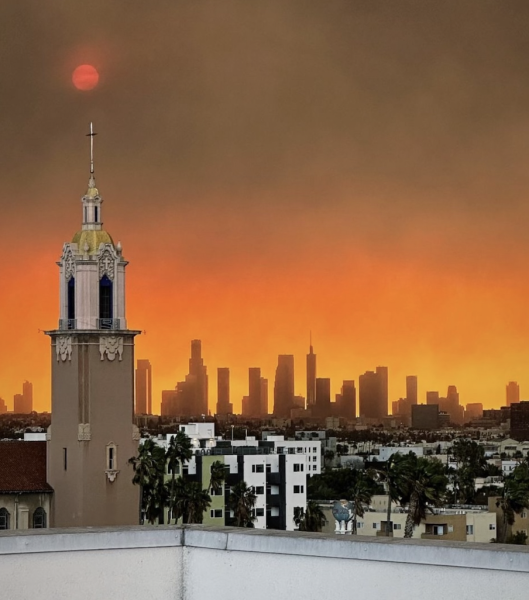Wildfires swept across the greater Los Angeles area, including the Palisades area, since Jan. 7, 2025, according to reports from California Department of Forestry and Fire Protection (CAL FIRE).
At the time of publication, the fires have ravaged 23,713 acres, with 17% of the area contained by firefighters. The official cause of the fires is under investigation although the “seasonally dry Mediterranean climate” and winds creates conditions that make the region vulnerable to wildfires, with the government designating Fire Hazard Severity Zones by susceptibility ranging from “Moderate” to “Very High.”
Lost homes, lost livelihoods
Ashritha Nayini, a resident of the Sawtelle-Brentwood area and Green Hope alumna (‘18), described the “eerie” state that wildfires have left Los Angeles County in.
“We didn’t leave the apartment at all. We’re still not leaving the apartment just because the air quality is pretty bad but you know airports are very empty. The roads are very empty,” she said. “[My friends and I] were really scared the first night, actually. We didn’t sleep because we were right on that borderline of that zone but thankfully, we didn’t move south and move north.”
Locals like Nayini are familiar with seasonal fires, explaining that the area is known as “The Brush,” a term derived from the low-lying dry vegetation that burns easily and spreads rapidly, according to Pepperdine University.
“[E]ssentially the fires are ravaging the area called “The Brush” so that’s where there’s a lot of vegetation and plants that are easily catching fire,” she said. “Because of the Santa Ana winds and just the rate of how windy it was earlier this week with the combination of being ‘The Brush’ it was just a really bad combination so it’s really affecting like the north the north east.”
The Californian government has issued Evacuation Orders and Warnings to dozens of areas. The Los Angeles Unified School District (LAUSD) opened its facilities Monday Jan. 13, 2025, however, most of the schools in the area remained closed from the hazardous conditions.
Nayini shared that many friends and acquaintances had lost their homes to the fires.
“[T]here’s so many people that are so close to us – even removed from us – that have been entirely affected by this, like their homes and livelihood are essentially gone,” she said.
The county estimated that 5,000 buildings have been damaged since the start of the fires, and the city currently has seven evacuation centers for refugees.
“The city is very scared. I mean it’s obviously really scary. I think we’re kind of getting to a point where there’s a lot more like help and there’s people setting up camps and evacuation shelters,” said Nayini. “[A] lot of my friends who are living closer to the fires came to ours to evacuate.”
Lack of communication leaves residents scrambling

Despite the extensive news coverage and some alerts from the government, Nayini felt as if the inundation of information made it difficult to discern important announcements.
“To be completely frank? I will say that there has not been really one systematic way of getting information,” she said. “I will say that the relaying of information and the way we’ve been understanding it has been honestly just us relying on ourself and our ability to research.”
Days earlier, when Nayini and her friends were deciding whether to evacuate, they reported a lack of notifications that provided guidance on the matter.
“But during the actual peak time of trying to figure out if we need to evacuate or not, which is I think was around Tuesday and Wednesday, we received absolutely nothing, which was really weird.”
However, she described Watch Duty, a nonprofit that provides wildfire maps and alerts, as providing a stable, dependable stream of updates in midst of the chaos. “We’ve been using Watch Duty that’s the app that I think the entire city of LA is probably so thankful for because it’s a hard to get real and easy-to-consume information because every new channel says something, every form of information that we’re getting is so different so that app has been really helpful.”
One source of media that hasn’t been helpful to Nayini is social media.
“In terms of announcements, information, protocols, again, I think it’s kind of like an “info-demic” right. Me and my friends are talking about how it’s so overwhelming to get so many different sources of information saying there’s a fire and a lot of them are not true you know,” she shared.
“Even on TikTok, people are taking pictures of Maui and posting that as destruction of the Pacific Palisades and it’s just so much misinformation.”
Residents wait anxiously for updates and recovery
“I will say there’s been a lot of talk about even the mismanagement of these wildfires. You know insurance companies, pulling out of peoples houses and peoples families like earlier before, almost like a week before the fire started, a lot of fire hydrants ran out of water essentially.”
“Pacific Palisades is also home; [my friends and I] used to walk there and go there all the time … But when you live here, we kind of have a better understanding of how the geography of it works, and how the winds move.”
As Nayini and her friends continue to seek safety from the wildfires, they reflect on the loss of what they consider home: the neighborhoods, shops and parks that have become part of their lives in the past few years.
“These places are what we considered home so it’s still devastating.”
This story was originally published on The Green Hope Falcon on January 14, 2025.




































